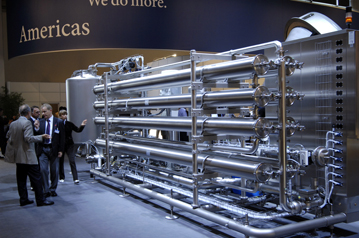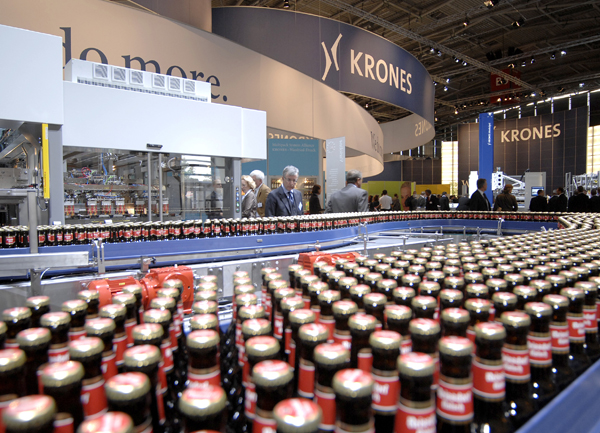The curtain opens at September 16, 2013. Then drinktec 2013, the World’s Leading Trade Fair for Beverage and Liquid Food Technology, shows how technology of the future looks like. What technology trends will determine the production, bottling and packaging of beverages and liquid food of all types in the coming years? And what does that mean for the beverage manufacturers and – bottlers? We wanted to know that right now and therefore we asked those who need to know it best: the exhibitors of drinktec 2013.
Process Technology for Beer
The use of raw materials will be a central theme of drinktec 2013 in two respects. This prediction comes from Professor Martin Krottenthaler from the Weihenstephan Triesdorf University. He says, “Here, in the global market, the first matter of interest is the highest possible yield. The second is that the raw materials will become more variable. The central question is: where do I get the starch for brewing at low cost? And it doesn’t have to come from traditional raw materials, if, perhaps, logistical costs are rising, or the competition is growing, or because of the arable areas. This directly influences the machine technology needed.” Professor Krottenthaler sees human resources as another strategic corporate goal. “Employees with dual training, meaning they are equally competent in theory and practice, will become an important factor for the future, as this is the only way to operate the complex production units optimally with the lowest possible input from human resources.”
Process Technology for Milk
Hygiene is another important watchword in the dairy business. According to Knuth Lorenzen, the President of the European Hygienic Engineering & Design Group (EHEDG), consistent use of all the suggestions from Hygienic Design can considerably reduce CIP times. The motto is ‘easy to clean’, because shorter cleaning times greatly increase the availability of the plant. In all these areas, drinktec 2013 offers visitors from the dairy industry many exciting state-of-the-art technical innovations. Here, besides offering information about the latest technologies for manufacture, filling and packing, drinktec also has raw materials and logistical solutions on show. Rounding off the portfolio are the topics of beverage marketing and packaging design, which are also important for the dairy industry.
Process Technology for Wine
Now decanters can also successfully replace the press, the dominant method of juice extraction since the days of the Romans, as Robert Stangl, Regional Manager Food Technology at the drinktec exhibitor Alfa Laval, explains: “Nowadays decanters not only handle must clarification and yeast separation, these machines can also be used to extract must or juice from the grapes. Scroll-type centrifuges have already more than proven their effectiveness as compared to conventional presses. The more constant values, the easier operation and the drier residues all lead to greater efficiency. For vintners this means a higher yield with precisely calculable costs. Several well known institutes in Germany and abroad can confirm these results. For this reason Alfa Laval will probably be exhibiting a decanter of this type at drinktec 2013.”
Cross-functional process technology
GMP, short for “good manufacturing practice”, is a comprehensive quality assurance system that is gaining ground around the world. Just how it works is described by Heinz-Jürgen Kroner, Managing Director of the drinktec exhibitor Pentair Südmo: “For us system designers, GMP basically presents two challenges: Firstly, as the competitive environment gets ever tougher, investment and operating costs should be as low as possible. Secondly, the input required for quality, performance, safety and documentation is constantly rising. The automobile industry is showing how to master this twin challenge. They build a wide range of models and brands on one standardized vehicle platform. The manufacturer is therefore deliberately moving away from individual production to a module-based system. This trend will be evident in many areas at the next drinktec.”
Labeling technology
In particular when lines are changed often, these machines boost cost-efficiency tremendously, thanks to plug & label units. Markus Müller, Heuft Systemtechnik, explains: “The ever increasing diversity in beverages packaging and packaging styles is demanding compact, flexible solutions that are highly automated, highprecision solutions for applying different types of label and for rapid change-overs that save on personnel and material costs. There is a trend towards camera-based,
Innovative filling technology
Prof. Dr.-Ing. Matthias Niemeyer, Chairman of KHS GmbH, sums up the trends in filling technology: “At drinktec 2013 we will again see a clear orientation towards meeting customer wishes and, allied to this, a maximization of benefit. In this context the aspect of sustainability plays a key role. At the same time modular-designed filling technology will also be a central theme. This involves increased filling quality, better system availability and lower costs for maintenance, energy water and cleaning agents – advantages that are generated also by consistent application of hygienic design.”
Aseptic filling
For Holger Kahlert , Vice President Filling Technology at Krones AG, Neutraubling, the general trend in aseptic filling is towards a significant reduction in cleaning and sterilization media: “The plant operators want to move away from the classic wet-aseptic with peracetic acid or dry sterilization with hydrogen peroxide towards chemical-free systems, for example using irradiation. ‘No water, no life’: if the isolator always remains dry and no chemicals are used, then micro-organisms have no nutrient to feed on, and no contamination can arise.”
Process automation and IT
This trend towards tailor-made automated solutions for all sizes of company, i.e. for global players as well as for SMEs, will continue at drinktec 2013. A second main focus, according to Gunther Walden, Head of Food & Beverage at the Siemens Division Industry Automation, lies in process optimization: “The focus will be on solutions which will help companies in the beverages industry increase their productivity. These offers are aimed at reducing the total cost of ownership (TCO) for the operators, while maintaining high product quality and providing greater flexibility. These include products and solutions to increase energy-efficiency in production.”
Sweetening, Color, Flavor
One absolute must-visit for marketing and technology divisions of brewing and soft drinks groups and SMEs, dairy producers and liquid foods manufacturers, is the “Special Area New Beverage Concepts” in Hall B1. At this location manufacturers will be presenting and explaining their new sweetening, coloring and flavoring 4strategies. BENEO, for example, a leading manufacturer of functional ingredients, will be demonstrating ideas for a better balance in energy-boosting products: “Consumers are increasingly focusing on drinks concepts that release a steady supply of energy, avoiding the so-called ‘boost and crash’ effect. It is ingredients like ginseng or Palatinose™ (Isomaltulose) that rate highest on this criterion, as they are natural products that also offer nutritional benefits,” explains Jens Böhm, Marketing Manager for BENEO.
Hygienic Design
According to Richard Clemens, Managing Director of the conceptual sponsor of drinktec, the Food and Packaging Machinery Manufacturers Association (Fachverband Nahrungsmittelmaschinen und Verpackungsmaschinen), affiliated in the VDMA (Germany´s engineering federation), hygienically designed technology optimized for production processes offers more than just microbiological safety: “Product safety, i.e. protection of the consumer, is of course the main focus. But the hygienic design of process, filling and packaging systems also offers benefits in terms of efficiency: easy-to-clean surfaces and components will save on water, cleaning agents and energy. The total time spent on cleaning is shorter. And that means longer production times and increased efficiency of the systems technology.”
Water treatment and water management
Careful, i.e. cost-efficient use of the resource of water will be a common theme covered right through the exhibition halls at drinktec 2013, in particular at the booths of the exhibitors in Halls A3, A4 and B2. Professor Dr. Stefan Schildbach from the University of Fulda, Dept. of Food Technology, describes the current situation as follows: “Sustainability most certainly also affects the subject of water processing. Savings that only a few years ago were considered too small and not cost-effective to implement, are now becoming ever more interesting. I am thinking here, for example, of the processing of water from filter backwash and of further increasing the yield in reverse osmosis plants. Also, intelligent control and monitoring strategies will start to become more important.”
Material handling engineering and Intralogistics
drinktec exhibitors have long since geared up to the changing warehouse environment and produced corresponding solutions, as illustrated by Andreas Oy, Sales Director at SSI Schäfer Noell GmbH: “At present there is increasing demand in the beverages sector for modular and scalable concepts which the manufacturers can use for optimum space utilization, for significantly increasing availability, deliverability and service quality, and for higher throughput. One current example is a fully automated compact channel warehouse with a Lift&Run 5system, orbiter shuttles and intelligent materials handling control from the warehouse management system for Gerolsteiner beverages manufacturer.”
Final packaging and palletizing systems
“Cost-efficiency, flexibility and sustainability are the key benchmarks for futureoriented final-packaging and palletizing systems,” says Dipl. Ing. Heiner Schaefer, Managing Director of Schaefer Förderanlagen- und Maschinenbau GmbH. “Reducing the material used on beverage containers and minimizing the secondary packaging presents a big challenge to the way beverage manufacturers work. Continuous three-shift operation with 8000 and more production hours per year, combined with extended maintenance intervals are the key features of the new machinery concepts. Packaging innovations at ever shorter intervals demand a great degree of flexibility in terms of machinery and plant. Off-line solutions are particularly popular for increasing the automation of packaging, sorting and mixing operations. Energy-optimized drive systems and plant concepts also make their contribution towards sustainability. At drinktec 2013 visitors and customers from all over the world will be seeing solutions on these trends and challenges.”


